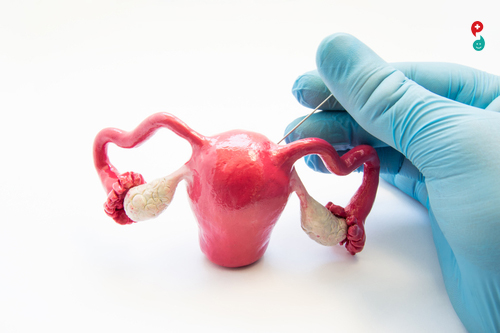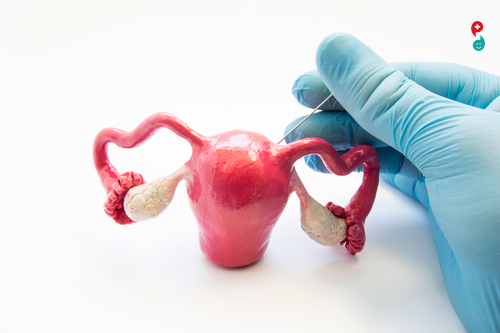Your medical history is an important tool for your doctor in determining whether you have premenstrual syndrome Your medical history includes your:
Record of your PMS symptoms, menstrual dates, and ovulation dates, if possible. It may help to keep a menstrual diary
History of PMS-like symptoms.
Menstrual history (age when you had your first period, problems related to menstruation such as cramping).
Pregnancy history (whether you've had children, what your pregnancies and deliveries were like, and what kinds of birth control you've used).
Family health history (female relatives with PMS).
Sexual history, including sexually transmitted infections (STIs)
Based on the length and regularity of your menstrual cycles your doctor will try to determine whether you are releasing an egg from the ovariesClick here to see more information. each month
Your doctor may also ask you about your mental health history, including:
Past episodes of depressionClick here to see more information., bipolar disorder anxiety panic attacks or other mental illness.
Current symptoms of depression, anxiety, panic attacks, personality disorder, or attention deficit hyperactivity disorder (ADHD).
Family history of mental illness.
History of depression after childbirth postpartum depression
PMS can cause emotional and behavioral symptoms similar to those of depression or ADHD, so it's important to find out whether you have one of these problems. Some of these problems can get worse during the premenstrual phase. If you have PMS as well as another disorder, you may need treatment for both conditions.
Why It Is Done
Your doctor will take your medical history if you are having any symptoms of PMS. If your symptoms affect your mood or behavior, a mental health history is important.
Results
A diagnosis of PMS is indicated when:
Your symptoms consistently occur (or get worse) between the day you ovulate and the first days of your period. While just over 50 out of 100 women ovulate around 2 weeks before their period, the time of ovulation can vary from woman to woman and month to month. Use a menstrual diary to keep track of when your symptoms occur.
Your medical history does not suggest any other conditions that may be causing your symptoms.
What To Think About
No single test can diagnose PMS. A diagnosis of PMS is usually based on your symptoms and medical history. Tests to check for other medical conditions that might be causing symptoms should be done only as needed.
आपल्याकडे प्रीमेनस्ट्रल सिंड्रोम (पीएमएस) आहे का हे निर्धारित करण्यासाठी आपल्या डॉक्टरांचा वैद्यकीय इतिहास हा एक महत्वाचा साधन आहे
शक्य असल्यास, आपल्या पीएमएसच्या लक्षणे, मासिक पाळी, आणि ओव्हुलेशन तारखांचे रेकॉर्ड. मासिक पाळी ठेवण्यास मदत होऊ शकते,
पीएमएससारख्या लक्षणांचा इतिहास.
मासिक पाळीचा इतिहास (जेव्हा आपले पहिले काळ होते तेव्हा वय, मासिक पाळी संबंधित समस्या जसे क्रॅम्पिंग).
गर्भधारणेचा इतिहास (आपल्याकडे मुले आहेत, आपल्या गर्भधारणा आणि प्रसूती कशा आहेत आणि आपण कोणत्या प्रकारचे जन्म नियंत्रण वापरले आहे).
कौटुंबिक आरोग्य इतिहास (पीएमएस सह महिला नातेवाईक).
लैंगिक संक्रमित संक्रमणांसह लैंगिक इतिहास (एसटीआय) अधिक माहिती पाहण्यासाठी येथे क्लिक करा
आपल्या मासिक पाळीच्या लांबीच्या आणि नियमिततेच्या आधारावर चित्रण पाहण्यासाठी येथे क्लिक करा. आपण अंडाशयातून अंड्यातून बाहेर पडत आहात की नाही हे निर्धारित करण्यासाठी आपला डॉक्टर प्रयत्न करेल.
आपले डॉक्टर आपल्या मानसिक आरोग्य इतिहासाबद्दल विचारू शकतात, यासह:
पीएमएसमुळे उदासीनता किंवा एडीएचडीसारख्या भावनात्मक आणि वर्तनात्मक लक्षणे उद्भवू शकतात, म्हणून आपल्याला यापैकी एक समस्या आहे का हे शोधणे महत्वाचे आहे. Premenstrual टप्प्यात यापैकी काही समस्या वाईट होऊ शकतात. आपल्याकडे पीएमएस तसेच इतर आजार असल्यास आपल्याकडे दोन्ही परिस्थितींसाठी उपचार आवश्यक आहे.
आपल्याला पीएमएसची कोणतीही लक्षणे असल्यास आपले डॉक्टर आपला वैद्यकीय इतिहास घेतील. जर आपल्या लक्षणे आपल्या मनःस्थिती किंवा वर्तनावर परिणाम करतात तर मानसिक आरोग्य इतिहास महत्वाचे आहे.
परिणाम
पीएमएसची निदान तेव्हा दर्शविली जाते जेव्हा:
आपल्या लक्षणे दिवसाच्या आणि आपल्या काळातल्या पहिल्या दिवसादरम्यान आपले लक्षणे सतत (किंवा आणखी वाईट होतात) होतात. 100 पैकी केवळ 50 स्त्रिया त्यांच्या कालावधीपूर्वी सुमारे 2 आठवडे ओव्हुलेट करतात, परंतु ओव्हुलेशनचा काळ स्त्री पासून स्त्री आणि महिन्यापासून महिने वेगवेगळ्या असू शकतो. मासिक लक्ष दैनंदिनी वापरा, जेव्हा आपले लक्षणे आढळतात तेव्हा बाह्य दुव्यावर क्लिक करा (अधिक माहिती पाहण्यासाठी पीडीएफ काय आहे येथे क्लिक करा. दस्तऐवज?).
आपले वैद्यकीय इतिहास आपले लक्षणे उद्भवणार्या इतर कोणत्याही अटींचा सल्ला देत नाही.
कशाबद्दल विचार करायला पाहिजे
पीएमएसचा कोणताही एक तपासणी निदान करू शकत नाही. पीएमएसचा निदान सहसा आपल्या लक्षणे आणि वैद्यकीय इतिहासावर आधारित असतो. इतर वैद्यकीय परिस्थिती तपासण्यासाठी टेस्ट ज्यामुळे केवळ लक्षणे म्हणूनच लक्षणे आवश्यक आहेत.










